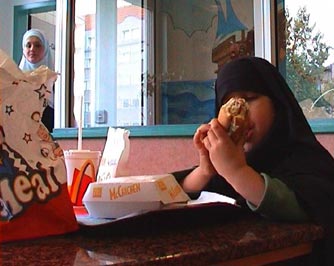
“i?” from 20th of March In collaboration with |
English ¦ Deutsch |
 |
|
The current video production touches upon a related thematic complex: “i?” consists
of ten episodes describing a day in the life of the protagonist O, played
by Shahram Entekhabi. The video is inspired by Samuel Beckett’s
film Film, starring Buster Keaton, a work already evoked by Gilles Deleuze
in reference to his subdividing the moving image into images of action,
images of perception, and images of affect. Like in Film, its predecessor, “i?” deals
with the complex of seeing and being seen, observing and perceiving,
and reflects on the famous dictum of the Irish bishop Berkeley: “Esse
est percipi” (To be is to be perceived). In Entekhabi’s interpretation
of the theme, however, the complex is expanded around the self and foreign
perception through both a migratory perspective and the question of identity
between two cultures. Therefore, in the film, the perspectives of the
protagonist and camera continually alternate; and apart from the final
scene, O’s face (and later the appearance of his “twin”)
is never shown. The film begins and ends in a closed cycle within the
protagonist’s apartment, with the action revolving at all times
around O’s reflection.
The 12 minute video-film „Herr Karl aus Nemsa“ (Mr. Karl
from Nemsa) is presented as being Shahram Entekhabis and Helmut Kandl
joint project. Historic archive material from the beginning of the
20th Century taken from the Austrian State Museum displays images of
the Islamic world. Paired with the sequence of pictures are quotations
from the writer Karl May*. Prayer and religious chants make up the background
soundtrack. Again, the differentiation within the specific nationalities
and the prejudices against them, are examined.
As closing part of the project, the results of a five-day workshop that
Shahram Entekhabi did together with nine youths and the "Next-Interkulturelle
Projekte" are presented. Three video films were produced that reflect
on Shahram Entekhabi work “i?” and deal with questions of
identity as well as topics such as self-image, voyeurism and being the
object of observation.
The exhibition takes place parallel to the project Far Near Distance:
Contemporary Positions of Iranian Artists, on view at the House of World
Cultures (March 20 to May 9, 2004), where Shahram Entekhabi participates
with the installation Kilid.
*(Karl May is a German writer popular for his
cowboy and Indian novels.)
Thanks to Helmut Kandl; Next. Interkulturelle Projekte;
Hermann-Köhl-Oberschule,
Berlin-Tempelhof; Haus der Kulturen der
Welt, Niederöstereichisches
Landesmuseum